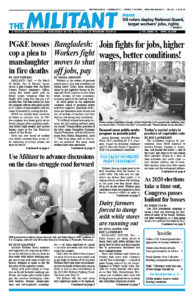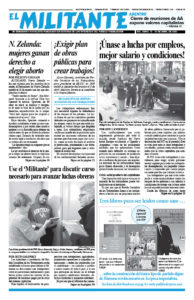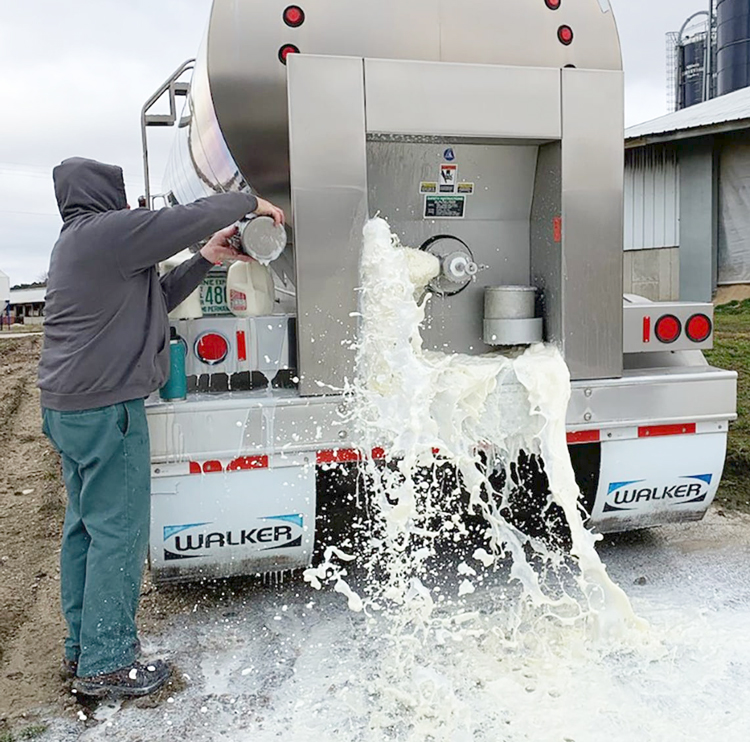RICHLAND CENTER, Wis. — Dairy farmers are being forced to dump fresh milk while millions face going short of dairy and food supplies due to government shutdowns and mass unemployment.
Stores like Walmart and Costco are limiting how much milk customers can buy due to shortages — a result of panic-buying induced by the bosses’ response to today’s social crisis. Despite this strong demand, dairy farmers in New York, Pennsylvania, Wisconsin and elsewhere have been told by big processing plant bosses to dump tens of millions of gallons of milk.
“Throwing away milk? It makes me sick. It’s disgusting,” Jerry Wastlick, who works with his brother milking 40 cows in Wonewoc, Wisconsin, told the Militant April 6. “There were milk contracts with schools. Now the kids are at home. They could use that milk, and the cheese for pizza.”
“We haven’t been affected yet. But it’s scary. If you have to dump it there’s no insurance,” he said. “I do know the price [we get] has been going down. We don’t know if it’s long-term or short-term.”
Government lockdowns and their mandated mass closure of restaurants and schools have forced a sudden shift from wholesale food services to retail grocery stores, but the need to reconfigure packaging machinery and distribution chains for processing milk, butter and cheese means bosses have to cut back. Milk and cream are perishables that can’t be stored for long. And sales to major export markets have dried up as shutdowns have been imposed worldwide.
Capitalist crisis hits family farmers
So farmers are being told to cut production. The bosses of Wisconsin-based Foremost Farms USA went further than just requiring farmers to dump their milk. In a March 17 letter, they warned ominously, “Now is the time to consider a little extra culling of your herds.”
The growing crisis of capitalism is driving more working farmers deeper into crushing debt or off the land altogether. This is the result of the inevitable workings of the system of exploitative capitalist social relations on the land, which is exacerbated by floods, disease or other natural causes. Smaller-scale family farmers are hit particularly hard.
They’re caught in a vise with costs of inputs from seeds, pesticides and machinery rising, while the price they get for milk has fallen nearly 40% in the past five years. More of the share of wealth generated by their toil is being taken by capitalist monopolies — the banks and agribusiness suppliers on the one hand, and the big processing firms and large grocery chains on the other.
Family farms, many of which are handed down from generation to generation, face skyrocketing debts and are going under in this squeeze. The concentration of farmland and especially of production in the hands of big capitalist operations keeps growing. Some mega-farms with herds in the thousands, not hundreds, and with highly mechanized round-the-clock operations yield more milk per cow.
The number of farms in the U.S., as in other imperialist countries, continues its historical decline. In 2017, more than half the milk cows were on dairies with herds of more than 1,000 compared to only 20% two decades ago. While the number of milk cows has halved in the last century, milk production has more than doubled.
Wisconsin dairy farmer Brittany Olson told the Milwaukee Journal Sentinel that when she hears that “small farms like ours likely have no future, it makes me feel like little more than a peasant in a system of modern-day feudalism.”
“In order to keep small family farms in business, we have to have a living wage,” Cindy and Steve Schmitz, Wisconsin dairy farmers, told the Militant. The Socialist Workers Party champions the demand for working farmers to be guaranteed their costs of production, including family living expenses.
The party’s 2020 campaign platform demands nationalization of the land “to put a halt to farm foreclosures, bankruptcies and skyrocketing rural debt. This puts the soil in the service of farmers who till,” which was the policy of the Cuban Revolution.
Meat, fruit and vegetable producers are also being hit by the shift from wholesale to retail distribution. Normally plentiful products are running short on grocery shelves.
“This is a crisis within the crisis,” Karl Butts, 67, a Florida market gardener, told the Militant April 6. He was referring to the sharpening of the capitalist crisis as government shutdown policies have affected both the tourist trade there and forced wholesale markets to close.
“Prices dropped as demand dropped” for fresh produce, Butts said. “Sellers who can’t sell, end up dumping their produce. Many farmers are forced to plow crops back in because they can’t recoup the costs of harvesting or picking.”
Government-mandated quarantines of seasonal immigrant farmworkers have affected many of the 60,000 temporary workers in Canada and nearly 250,000 in the U.S. The less produce that reaches markets, the more prices will soar.
“If the farm doesn’t produce, the city doesn’t eat,” Abad Hernandez Cruz, a Mexican farmworker employed in the onion harvest in Georgia, told Reuters.
Randy Jasper in Wisconsin contributed to this article.


